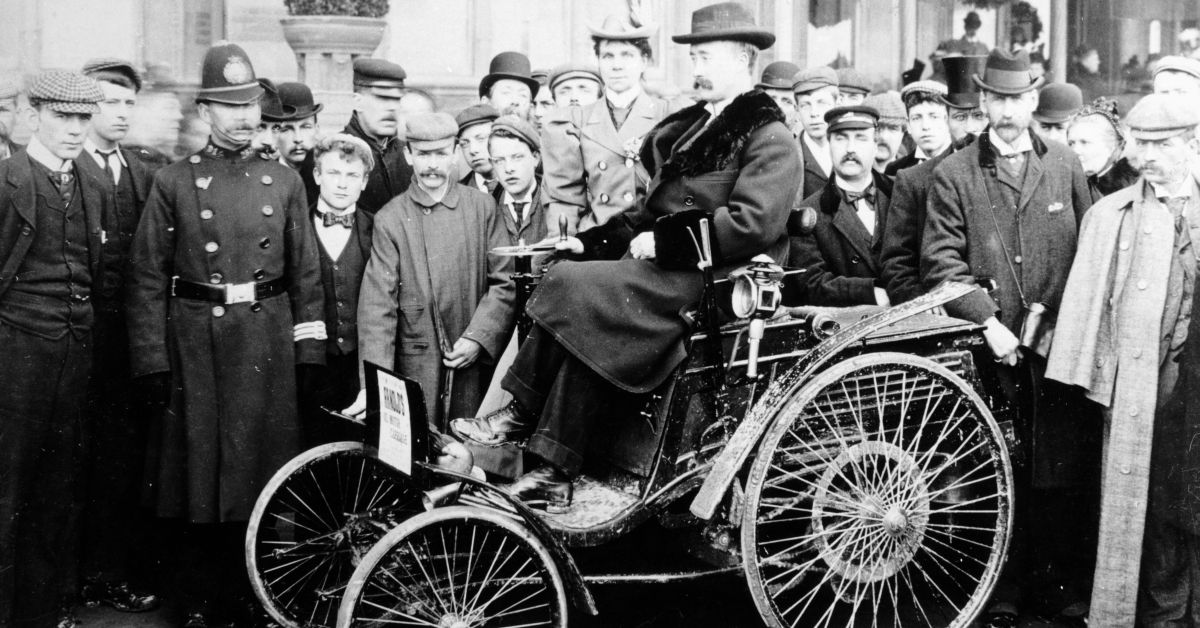In early 2022, social media users enthusiastically shared a charming and intriguing post about what was described as "Britain's first speeding ticket." On Jan. 27, for example, the historian and broadcaster Dan Snow wrote on Twitter:
This week in 1896 driver Walter Arnold received Britain's first speeding ticket. He had been caught in a Motor Carriage like this going four times the speed limit - at 8mph. He was chased and pulled over by a policeman on a bicycle.
That description was accurate, and we are issuing a rating of "True." Though not mentioned by Snow or others, Snopes has discovered a similar driving offense which took pace slightly earlier in January 1896 but, technically, did not result in a charge of speeding, leaving the Arnold incident with the apparent distinction of being the first speeding ticket in British history. We also did not find sources to corroborate the specific claim that Arnold had been driving at 8 mph, or that he was apprehended by a police officer on a bicycle.
The Locomotives Acts and the 1896 Speed Limits
In the late 19th century, motor vehicles — which had not yet reached widespread use — were regulated in the U.K. by a series of laws called the Locomotives Acts. The 1865 Locomotives Act, in particular, contained a section that effectively imposed a two-part speed limit: 4 mph in the countryside; and 2 mph in cities and towns:
...It shall not be lawful to drive any...locomotive along any turnpike road or public highway at a greater speed than four miles an hour, or through any city, town or village at a greater speed than two miles an hour.
The 1865 act was sometimes colloquially known as the "Red Flag Act" due to its third section, which — to the great amusement of modern-day observers — required no fewer than three individuals to operate any non-animal-powered locomotive, one of whom had to walk "not less than 60 yards" ahead of the vehicle, waving a red flag and "[warning] the riders and drivers of horses of the approach of such locomotives."
On Jan. 20, 1896, Arnold — a "traction engine proprietor" with a business in East Peckham, Kent — was stopped while driving his car, most likely an "Arnold-Benz" similar to the one shown in Snow's tweet, at Paddock Wood, near Tunbridge Wells, Kent, around 40 miles southeast of London. He was later charged with four offenses, as one contemporary newspaper report explained:
There were four summonses against the defendant — namely, that the vehicle was not worked according to the Locomotives Act, which requires that at least three persons shall be employed to drive it, and that one shall precede it when in motion; that the name and residence of the owner were not affixed to the carriage; that the speed exceeded two miles and hour; and that no license had been obtained...
Through his lawyer, Arnold pleaded not guilty, claiming that the Locomotives Acts were written without motor vehicles in mind, and so did not cover such vehicles. The court convicted him and ordered him to pay various fines and court fees.
It's not clear whether Arnold deliberately set out to get caught violating the Locomotives Acts, but either way, his could reasonably be regarded as a "test case" as part of a broader push to reform and loosen the existing regulations on motor vehicles — which would, of course, have the indirect effect of expanding the market for Arnold's products. Later in 1896, the U.K. parliament duly increased the speed limit to 14 mph.
During the Commons debate over the liberalization of the speed limit, some members warned of an inexorable upwards rise in the speeds of horseless carriages. One member reportedly "asked the House to fancy these things going along at 18 miles an hour," while another member provoked laughter when he "inquired whether they could not look forward to going 20 or 25 miles an hour some day."
Just a few weeks before Arnold's prosecution, another car salesman, this time in Glasgow, Scotland, became embroiled in a very similar case. As the Glasgow Herald reported:
At the Central Police Court yesterday...George Johnston...was charged with having contravened the Locomotives Amendment Act, 1878...in so far as he, being in charge of a locomotive propelled by steam, oil or other than animal power, and designated a horseless carriage, did, on 4th January, between 4 and 5pm, drive the locomotive along Buchanan Street, St. Enoch Square and Dixon Street, being highways along which locomotives are prohibited to pass between 9am and 5pm, whereby he was liable to a penalty of £5, or one month's imprisonment.
Johnston does not appear to have been specifically charged with speeding, and we could find no earlier record of a violation of the Locomotives Acts' 2/4 mph restriction, so Arnold does indeed appear to hold that distinction, as Snow's tweet correctly pointed out.
Like Arnold, Johnston also argued that his vehicle was not covered under the definitions contained in the Locomotives Act, and he pleaded not guilty. However, Judge Mitchell disagreed, convicted him, and ordered him to pay a fine of two shillings and six pence.
Johnston was a pioneer of the motor vehicle industry in Scotland who, like Arnold, had a vested interest in any liberation of the laws around speed limits, operation and registration. Later, along with the engineer and member of parliament William Arrol, he went on to form the Arrol-Johnston "Mo-Car" syndicate, which was one of the leading early producers of motor vehicles in Scotland.


